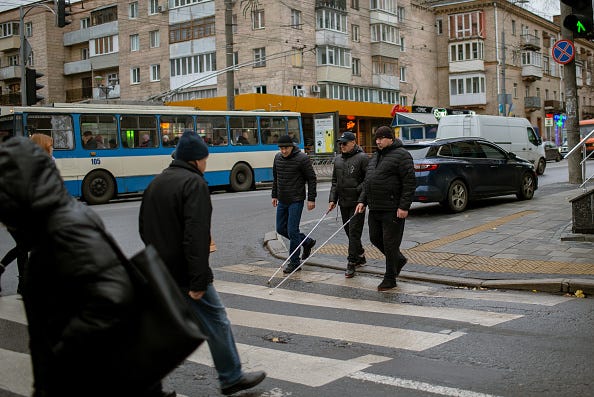Being blind in a war zone
Visiting a museum simulating blindness, Mariana explores the life of those with disabilities. Since the invasion, state funding for people with visual impairment has declined.
Editor’s Note: The U.S. embassy in Kyiv suddenly closed today due to what it said was "specific information" of a significant Russian air attack.
This is unprecedented in the full-scale invasion, so has raised significant alarm bells for us. We are sheltering in our office as we publish today’s issue.
Help us confront the risks: Support our reporting by upgrading your subscription or hitting the tip jar.
The darkness frightened me at first.
I even thought I could see something in it, as my brain struggled to accept that there was a complete void. My imagination began to create outlines of objects: the walls, and the size of the room itself.
This went on until the first touch made me realize that my brain had been deceiving me — I truly couldn’t see anything.
Walking around in total darkness in a museum designed to help you experience the lives of blind people, I confronted this blankness for only an hour and a half. But thousands of people in Ukraine live by touch for many years.

According to various estimates, there are currently between 70,000 and 300,000 people with serious visual impairments in Ukraine. With the outbreak of war, this number will only increase as Ukrainians face the constant threat of death or disability from landmines and missile strikes. But nobody has compiled these statistics yet.
Struggling to find shelter or respond to air raid alerts, people with blindness are at greater risk of falling victim to Russian attacks. But those visual impairments are only a minority of people with disabilities who have day-to-day struggles heightened due to Russia’s ongoing invasion. By learning about their challenges, we also learn about the kind of society Ukraine is – and what sort of society its most vulnerable want it to become.
Despite the increasing number of people with blindness in Ukraine, the country has yet to fully adapt to this growing need.
There is currently no systematic governmental support for people with visual impairments in Ukraine. In particular, there are no state-run rehabilitation centers that provide services specifically for individuals who have lost their sight.
The situation used to be better, as the state used to support a voluntary organization, the All-Ukrainian Society of People with Blindness. The organization provides social support and has established libraries, sports clubs, and cultural centers for those with blindness. It also assists people with visual impairments in finding employment. However, after the outbreak of full-scale aggression by Russia, state aid to the organization ceased completely.
Paid subscribers get to finish the story, past the paywall. Consistent, high-quality journalism takes resources! If you’re not already a paid subscriber, upgrade now to read on!
Keep reading with a 7-day free trial
Subscribe to The Counteroffensive with Tim Mak to keep reading this post and get 7 days of free access to the full post archives.


